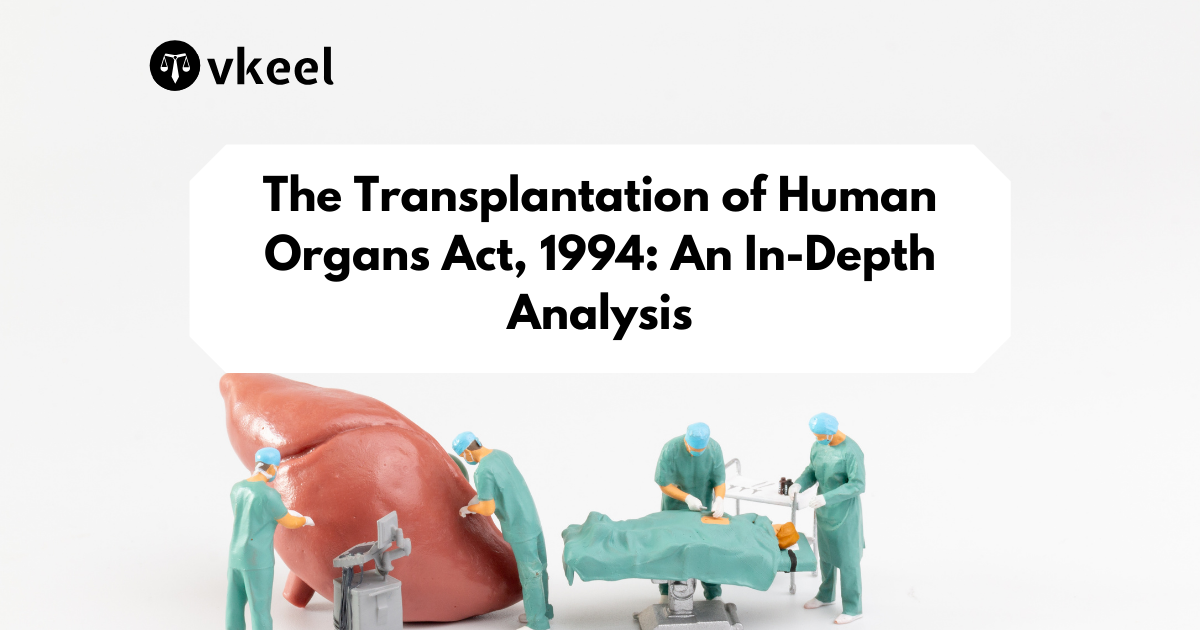The Transplantation of Human Organs Act, 1994: An In-Depth Analysis
By Himanshu Kumar
Table of Contents
Introduction
The Transplantation of Human Organs Act, 1994 (THOA), is a landmark legislation in India aimed at regulating the removal, storage, and transplantation of human organs for therapeutic purposes. This Act was introduced to combat the increasing illegal trade in human organs and to establish a legal framework for organ donation and transplantation. Over the years, the Act has undergone several amendments to address emerging challenges and to improve the efficacy of organ transplantation regulations.
The primary objective of the Transplantation of Human Organs Act, 1994 (THOA), is to regulate the removal, storage, and transplantation of human organs to ensure that these processes are carried out ethically and legally. The Act aims to curb the illegal trade of human organs, which often involves the exploitation of economically disadvantaged individuals. By prohibiting commercial dealings in human organs and enforcing stringent penalties for violations, THOA seeks to protect vulnerable populations from being coerced or exploited in the organ trade. The Act emphasizes the importance of informed consent, ensuring that organ donations are voluntary and made with full awareness of the implications.
Another significant objective of THOA is to promote organ donation and transplantation for therapeutic purposes, thereby addressing the critical shortage of organs available for transplantation. The Act provides a framework for the establishment of regulated and registered medical facilities authorized to perform organ transplants. Additionally, it mandates the creation of Authorization Committees to scrutinize and approve cases of organ donation, especially those involving unrelated donors, to ensure that the donations are altruistic and not commercially motivated. Through these measures, THOA aims to foster a legal and ethical environment that supports lifesaving organ transplants while maintaining the highest standards of medical and ethical practice.
Historical Background
Before the enactment of THOA, India did not have a specific law regulating organ transplantation. The lack of regulation led to numerous ethical issues, including the exploitation of economically disadvantaged individuals who were coerced into selling their organs. The alarming rise in illegal organ trade, coupled with the exploitation and health risks involved, prompted the need for a robust legal framework.
The enactment of the Transplantation of Human Organs Act in 1994 marked a significant step towards addressing these issues. The Act was designed to regulate the removal, storage, and transplantation of human organs, prevent commercial dealings in human organs, and ensure ethical practices in organ transplantation.
Key Features of the THOA
The Transplantation of Human Organs Act, 1994, provides a comprehensive framework for the regulation of organ transplantation. Some of its salient features include:
- Definition and Scope: The Act defines terms such as “donor,” “recipient,” “human organ,” and “transplantation,” providing clarity on the legal and ethical dimensions of organ donation and transplantation.
- Regulation of Organ Removal: The Act stipulates that organ removal for transplantation can only be carried out in hospitals that are registered and authorized by the appropriate authority.
- Consent for Donation: The Act emphasizes the necessity of obtaining informed consent from the donor. In the case of deceased donors, consent must be obtained from the next of kin.
- Prohibition of Commercial Transactions: One of the core objectives of the Act is to prohibit commercial dealings in human organs. The Act makes it illegal to buy or sell human organs and prescribes stringent penalties for violations.
- Authorization Committees: The Act mandates the establishment of Authorization Committees to scrutinize cases of organ donations between unrelated individuals, ensuring that the donations are altruistic and not commercially motivated.
- Transplantation Procedures: The Act sets guidelines for the transplantation process, including the roles and responsibilities of medical professionals involved in the procedure.
- Penalties for Violations: The Act prescribes severe penalties for those involved in the illegal trade of human organs, including imprisonment and fines.
Significant Case Laws
Several landmark judgments have shaped the interpretation and enforcement of the THOA. Here are some notable cases:
- Mr. X v. Hospital Z (1998): In this case, the Supreme Court of India dealt with the issue of confidentiality and the right to privacy in the context of a patient who was HIV positive. The Court held that the right to privacy was not absolute and could be overridden in public interest, particularly in the context of organ donation and transplantation, where the recipient’s health and safety are paramount.
- State of Tamil Nadu v. C.T. Scan Centre (1998): This case highlighted the issue of unauthorized organ transplantation. The Court emphasized the importance of adhering to the provisions of the THOA and ruled against unauthorized medical practices, stressing the need for strict regulatory compliance.
- Jeewan Kumar Raut v. CBI (2009): This case involved the illegal trade of kidneys. The Supreme Court upheld the stringent provisions of the THOA, reinforcing the prohibition of commercial dealings in human organs and underscoring the ethical considerations in organ transplantation.
- K. Krishnan v. State of Tamil Nadu (2014): In this case, the Madras High Court addressed the role of Authorization Committees. The Court emphasized the need for these committees to thoroughly scrutinize applications for organ transplantation to prevent commercial transactions disguised as altruistic donations.
Amendments to the THOA
The Transplantation of Human Organs Act, 1994, has undergone several amendments to address new challenges and to enhance the regulatory framework:
- The Transplantation of Human Organs (Amendment) Act, 2011: This amendment introduced several key changes:
- Inclusion of Tissues: The definition of “human organ” was expanded to include tissues, bringing tissue transplantation within the regulatory framework of the Act.
- Transplantation of Human Organs and Tissues Network (THOTN): The amendment proposed the establishment of a National Human Organs and Tissues Removal and Storage Network and State-level networks to facilitate organ sharing and improve access to transplantation.
- Increased Penalties: Penalties for offenses under the Act were enhanced to deter illegal activities.
- Greater Oversight: The amendment introduced measures for better oversight of hospitals engaged in organ transplantation, including stricter registration requirements and regular inspections.
- The Transplantation of Human Organs and Tissues (Amendment) Rules, 2014: These rules further strengthened the regulatory framework by specifying the qualifications and experience required for medical practitioners involved in organ transplantation, and by setting guidelines for the functioning of Authorization Committees.
Impact of the THOA
The Transplantation of Human Organs Act, 1994, has had a significant impact on organ donation and transplantation in India:
- Regulation and Oversight: The Act has provided a structured framework for the regulation of organ transplantation, ensuring that the process is conducted ethically and legally. The establishment of Authorization Committees has played a crucial role in scrutinizing organ donation cases, particularly those involving unrelated donors.
- Reduction in Illegal Trade: The stringent provisions and penalties under the Act have contributed to a reduction in the illegal trade of human organs. The emphasis on informed consent and the prohibition of commercial transactions have been pivotal in curbing exploitation.
- Awareness and Altruism: The Act has played a role in raising awareness about the importance of organ donation. Campaigns and initiatives by governmental and non-governmental organizations have encouraged altruistic donations, leading to an increase in the number of donors.
- Challenges in Implementation: Despite its successes, the implementation of the THOA faces challenges. These include the need for better coordination among various agencies, addressing the shortage of organ donors, and ensuring that the regulatory framework keeps pace with advancements in medical science.
- Judicial Interventions: Judicial interventions have been crucial in interpreting and enforcing the provisions of the Act. Courts have played a key role in upholding the ethical standards set by the THOA and in addressing violations effectively.
Conclusion
The Transplantation of Human Organs Act, 1994, is a cornerstone of India’s efforts to regulate organ donation and transplantation. The Act has provided a comprehensive legal framework to ensure that organ transplantation is conducted ethically and legally, protecting both donors and recipients. Significant case laws and judicial interventions have further strengthened the Act’s implementation and impact.
Amendments to the THOA have addressed emerging challenges and improved the regulatory framework, ensuring that it remains relevant in the face of evolving medical practices. While the Act has successfully curbed illegal organ trade and raised awareness about organ donation, ongoing efforts are required to address implementation challenges and to promote a culture of ethical organ donation.
As India continues to evolve in its approach to organ transplantation, the Transplantation of Human Organs Act, 1994, remains a vital legal instrument, embodying the principles of ethical medical practice and the commitment to protecting human dignity. The Act’s impact on saving lives and promoting altruism in organ donation is a testament to its importance in the realm of healthcare and human rights.
Disclaimer:
The information provided in the article is for general informational purposes only, and is not intended to constitute legal advice or to be relied upon as a substitute for legal advice. Furthermore, any information contained in the article is not guaranteed to be current, complete or accurate. If you require legal advice or representation, you should contact an attorney or law firm directly. We are not responsible for any damages resulting from any reliance on the content of this website.







